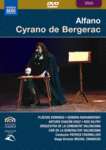|
Back
07/05/2011
Franco Alfano: Cyrano de Bergerac
Plácido Domingo (Cyrano), Sondra Radvanovsky (Roxane), Arturo Chacón Cruz (Christian), Rod Gilfry (De Guiche), Corrado Carmelo Caruso (Ragueneau), Roberto Accurso (De Valvert), Javier Franco (Carbon), Itxaro Mentxaka (La Duègne/Sister Marthe), Nahuel di Pierro (Le Bret), Silvia Vásquez (Lise/A Nun), Miguel Sola (Lignière), Juan José Navarro (The Musketeer), Juan Felipe Durá (A Cook), Antonio Lozano Mora (First Sentinel), Antonio Gómez Cano (Second Sentinel), Amadis de Murga (Montfleury), Rubén Belmonte (A Spanish Officer), Cor de la Generalitat Valenciana, Francesc Perales (Chorus Master), Orchestra de la Comunitat Valenciana, Patrick Fournillier (Conductor), Mario Dradi (Executive Producer), Tiziano Mancini (Video Director), Michal Znaniecki (Stage Director and Stage Designer), Isabelle Comte (Costume Designer), Boguslaw Palewicz (Lighting Designer)
A production of Unitel Classica and Palau de les Arts ‘Reina Sofia’ Valencia
Filmed at the Palau de les Arts ‘Reina Sofia’, Valencia (February 8, 11 & 18, 2007) – 141 min.
Naxos Ref #: 2.110270 – Booklet in English and French, Subtitles available in English and French

When one hears the name Franco Alfano, one thinks of the man who had the unerring distinction of completing Puccini’s unfinished Turandot back in 1926. This single association, unfortunately, detracts from focusing on Alfano’s other memorable works created for stage and orchestra. In this case, we have one of Edmond Rostand’s most famous stories come to life by way of Alfano’s opera Cyrano de Bergerac (1936).
Plácido Domingo’s name alone is worth its weight in gold, deserving much of the credit for bringing obscure operas (such as Wolf-Ferrari’s Sly, Verdi’s Stiffelio, Gluck’s Iphigénie en Tauride and Handel’s Tamerlano) to stage in recent years. Landing his 121st role (at the time of this DVD recording), the masterful tenor tackles the title role as the acerbic, loathsome, though tender-hearted poet, opportunistically assisting an inarticulate Gascon soldier (Christian) in attaining the woman (Roxane) they both love, at the expense of Cyrano’s unsightly nasal protuberance.
As a personal attestation, musically, Franco Alfano’s Cyrano de Bergerac has redolent tendencies to Alexander Zemlinsky’s Der Zwerg (1922) with its luscious, ethereal scoring that, at times, pops with flickering abruptness (similar in style to Debussy’s Pelléas et Mélisande and Puccini influences), delivering pleasant satisfaction alongside a dabble of alarming discomfiture. If one gleans unfavorable first impressions of Alfano’s score, give it another chance for many marvelous musical passages bring the feelings of vicissitude, power, delicacy and sincerity to the forefront.
Domingo’s tessitura falls nicely within Cyrano’s range, thereby deeply connecting with the poet’s ebb and flow of emotions. Sondra Radvanovsky, known for her emphasized Verdi connection, is a perfect Roxane, demonstrating a seamless passaggio and understated whimsical gesticulations. The Balcony Scene (Act II Part II) is one of the pinnacle moments in Cyrano de Bergerac that builds to momentous climax featuring a crushed Cyrano, a rapturous Roxane and a contented Christian, sung by Arturo Chacón Cruz who sings with a jeweled brilliancy; Rod Gilfry’s performance as the sardonic De Guiche is solid.
Under the direction of Michal Znaniecki, the production is taut and nicely paced, complimented by Patrick Fournillier’s conducting. The costuming, designed by Isabelle Comte, draws upon a tasteful palette of coordinated colors which allows the exquisite details in the dress to be magnified. In fact, Acts I and II are so pleasantly cohesive that it’s rather difficult to delineate the second tier of cast members (i.e. Ragueneau, De Valvert, Carbon, Le Bret, Lignière and The Musketeer.) The period appropriate clothing is reminiscent of d’Artagnan’s Les Trois Mousquetaires.
Znaniecki’s Spartan phlegmatic set design is timeless in nature, yet nowhere close to the opera’s original timeline set in the 1640s (in contrast to Peter Davis’ lavish 2005 Metropolitan Opera production.) The semicircular cement wall in Act II is dull; however, the props used in Ragueneau’s bakery are splendid. The trees and vegetation in the Balcony Scene are blatantly faux plastic, hampering the overall dramatic poignancy of this pivotal scene. Cyrano’s writings subtly bleed onto the back scrim just as he takes over the dialogue for Christian that electrifies the moment (a technique used in Los Angeles Opera’s recent staging of Catán’s Il postino.)
The video editing tries a bit too hard to create the recording as a work of art unto itself. Toward the close of each act, a montage of clips are seen as a remindful summary, set against the “real time” action unfolding on the stage. This detracts from the wonderful punctuated musical endings found in each act. The audio quality is a bit inconsistent. The volume during the opening credits is soft and muffled, but it continues to improve. Nowhere do titles appear prior to each act, making a lot of assumptions with regard to the viewing audience.
Most importantly, this Cyrano de Bergerac harvests a bounteous crop of vocal artistry and brings Franco Alfano’s oft forgotten four act opera to life. If, however, other elements had a bit more substance, the synergy would make this a first class production.
Christie Grimstad
|